Immunology and Molecular Microbiology
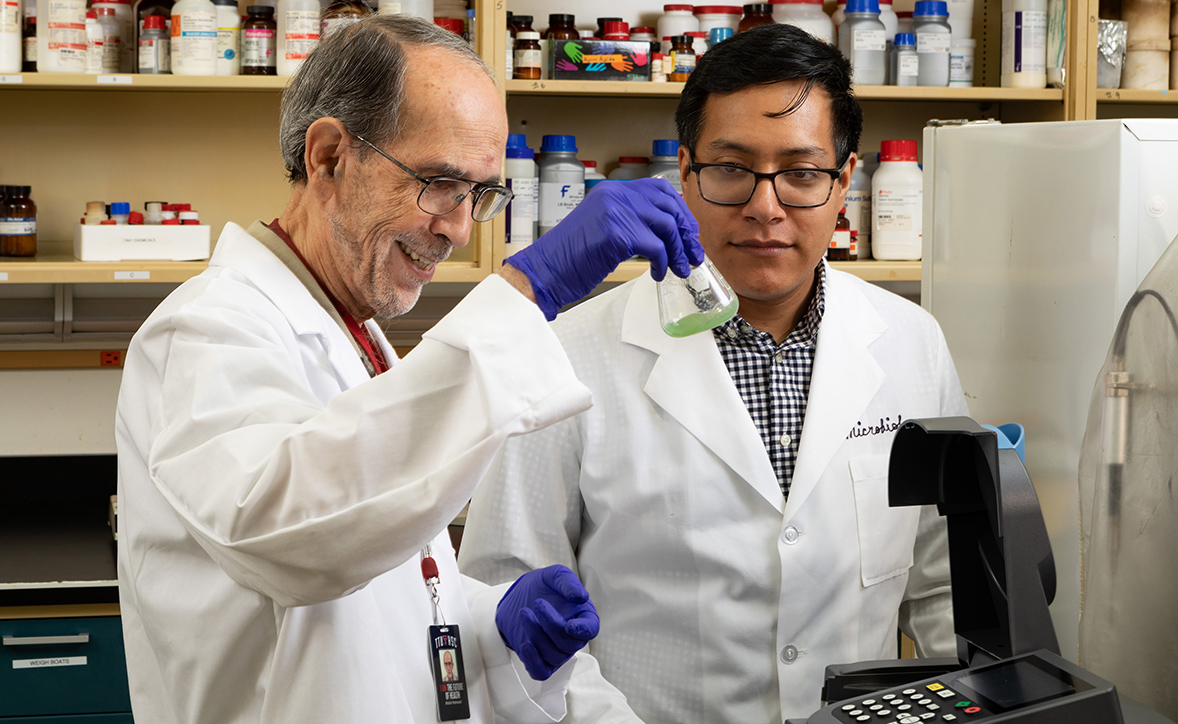
Advancing Immunology & Molecular Biology Research and Education
Welcome to the Department of Immunology & Molecular Biology. Our Department has a rich history of research and discovery in the basic, clinical and translational sciences. Our goal is to work towards improvement of health worldwide through the pursuit of excellence in research and training of medical and graduate students in infectious diseases; cancer immunology and epigenetics; and tropical medicine of public health importance. We apply the world’s most innovative science to the world’s worst diseases, with the eventual aim to develop novel diagnostics; and prevention and treatment tools for important diseases.
The department is currently comprised of 7 full-time faculty, 22 adjunct graduate faculty and we are actively recruiting new faculty. The Department serves as the host for The Center for Tropical Medicine and Infectious Diseases and is part of a major collaborative endeavor for sequencing and genotyping of SARS-CoV-2 variants in West Texas. The research in the Department is currently funded through major grants from the National Institutes of Health, Horizon 2020/European Union, the Wellcome Trust, the CH Foundation, the RIGHT Fund and Bill & Melinda Gates Foundation.
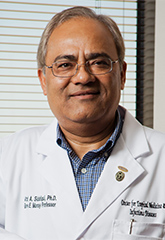
Afzal A. Siddiqui, M.Phil., PhD.
Professor and Chair
Grover E. Murray Professor
Director, Center for Tropical Medicine & Infectious Diseases
Afzal.Siddiqui@ttuhsc.edu
Current Research
Our faculty contribute to their personal fields of research, working to expand the understanding of immunology and molecular microbiology. In addition to their individual research pursuits, they're eager to work with external collaborators. Explore the dropdowns below to learn more about their current areas of interest.
Discover more about Dr. Almodovar-Camacho here.
- Cellular sources of HIV in chronic pulmonary disease
- Microenvironment in the pulmonary microvasculature: Implications in HIV disease progression
- HIV evolution in the lung in people using recreational drugs
- Refinement of animal models for HIV-associated pulmonary hypertension and other infectious diseases
- HIV evolution after COVID-19Long COVID in rural areas in Texas
Discover more about Dr. Bright here.
- Tumor vaccines
- Immune check point/ tumor vaccine combination
- Tumor antigen/ marker discovery & characterization
- Tumor antigen specific T cell epitope characterization
Discover more about Dr. Hamood here.
- Pathogenesis of Pseudomonas aeruginosa during bacteremia in severely injured/infected patients
- Pyocins as alternative antibacterial to treat Pseudomonas aeruginosa infections
- Influence of blood on the transcriptomes of Gram-negative bacterial pathogens
- Innovative approaches to eradicate bacteria biofilms
Discover more about Dr. Li here.
- Genomic data-analyses (genome, transcriptome, methylome, etc.) from raw (FASTQ/BAM) files.
- Integrative multi-omics analyses, transposable element analyses, and other genomic/bioinformatics analyses or development.
- Design, develop, and implement new bioinformatics pipelines.
- Method and software comparisons and benchmarking of available tools.
Discover more about Dr. Lee here.
- Pathogenesis of fungal infections, particularly those caused by Mucor species
- Calcineurin resistance in Mucor
- Antifungal drug development
- Intrinsic resistance of Mucor species to echinocandins
- Fungal microbiome (mycobiome) in human health and disease
Discover more about Dr. Siddiqui here.
- Parasitology
- Vaccine discovery, development and testing for human parasite Schistosoma mansoni
- Stronglyloides stercoralis hyperinfection
Discover more about Dr. Yaseen here.
- Cause natural killer (NK) cell expansion
- Prime cytotoxic CD8 T cell activation
- Release of type I cytokine mainly IFNγ, TNFα, and IL15
- Developing CARs against parasitic infections
Graduate Program
The Department of Immunology and Molecular Microbiology integrates several different disciplines (immunology, bacterial pathogenesis, virology, parasitology and molecular biology) to provide students with a unique educational experience leading to a PhD degree concentrated in Immunology and Infectious Diseases. This multidisciplinary concentration is one of six major programs offered by the Graduate School of Biomedical Sciences at the Texas Tech University Health Sciences Center.
Learn More
We invite you to learn more about our graduate programs in the Department of Immunology and Molecular Microbiology here.
Research Facilities
The Department of Immunology and Molecular Microbiology houses the Image Analysis and Molecular Core Facilities and occupies more than 15,000 sq. ft. of laboratory space within Texas Tech University Health Sciences Center (TTUHSC) that contains state-of-the-art molecular, cellular and immunological instrumentation.
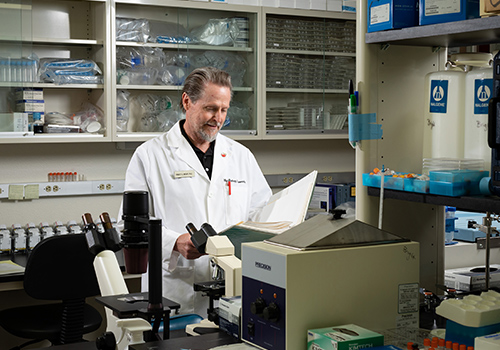
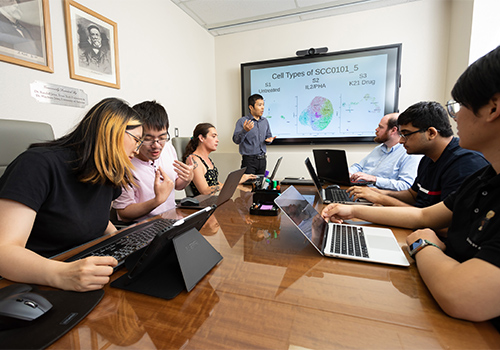
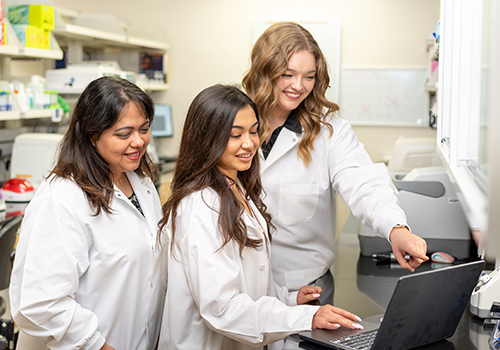
The Department of Immunology and Molecular Microbiology houses its own brand new departmental core facility containing modern, state of the art research equipment.
- The departmental core houses an IsoSpark Duo Cell Proteomics Platform with 2 x 4 chip capacity.
- We also house a Cytek Northern Lights 3000 (38+3 channel) 3-laser flow cytometer. This cytometer delivers high quality data, and easily resolves rare and dim populations, regardless of assay complexity.
TTUHSC is one of only three institutions in Texas to have this type of capability. The new 1,200-square-foot facility houses more than $2 million of laboratory equipment.
- The most powerful instrument in the Core Facility is a Nikon TiE confocal microscope equipped with an option known as N-STORM (Nikon Stochastic Optical Resolution Microscopy).
- This ultra-high resolution microscope enlarges images 6,000 to 10,000 times larger than the human eye can see.
- The microscope utilizes fluorescent probes to mark molecules in the cells.
- It scans the images 50,000 times or more, and within an hour can produce intricate images of the smallest structures within the samples.
- The images can also be combined to produce a 3-D model on a computer screen, so that the model can be moved to undergo more intricate analysis.
- In addition, this core houses a Zeiss LSM510/Meta confocal microscope, a Metafluor Imaging System and a variety of multimodality microscopes for imaging un-stained or fluorescently stained cells and thin sections.
- The Zeiss AxioCam CCD camera can be easily attached to the different microscopes for capturing images.
This is the newest core facility to open at TTUHSC. This 1,200-square foot facility houses the very latest molecular and cellular analytical equipment including an Amnis ImageStream cell analyzer, an Accuri C6 flow cytomer and a FACSJazz cell sorter.
- In addition, the Molecular Biology Core Facility houses the GE Typhoon and phosphorescence/luminescence analyzer.
- A BioLector as well as an Agilent Bioanalyzer and C1-Cell AutoPrep System.
- Fluidigm Auto Prep and Access Array systems are also housed in this core facility.
- Different PCR instrumentation and automated cell counters.
School of Medicine Cancer Center
In addition to the core facilities, faculty and students have access to a second Flow Cytometry laboratory that is operated by the Cancer Center in the School of Medicine.
- This state-of-the-art facility has a BD LSR II flow cytometer and a FACSAria cell sorter. The LSR II is capable of analyzing 16 simultaneous colors.
- TTUHSC also maintains a modern and well-equipped animal care facility that occupies 31,000 sq. ft. of space within the School of Medicine.
- This facility houses procedural space, conventional housing for rodents, barrier housing for immuno-deficient and germ-free rodents, and housing for non-rodent species.
- A new and free-standing medical library is located next to the Health Sciences Center building and is readily available to all of our students, faculty and staff.
The Cancer Center at the Texas Tech University Health Sciences Center School of Medicine (TTUHSC SOM) was established in 2008 to provide a center of excellence for cancer research for the School of Medicine and the entire South Plains region.
A major focus of the TTUHSC SOM Cancer Center is conducting laboratory and clinical research that develops new anti-cancer drugs for both adults and children with difficult-to-treat cancers.
Center for Tropical Medicine and Infectious Diseases
The mission of the Center for Tropical Medicine and infectious Diseases (CTMID) is to contribute to the improvement of health worldwide through the pursuit of excellence in research, and advanced training of MS/PhD-graduate students and MD-fellows in infectious diseases and tropical medicine of public health importance. We will strive toward making new discoveries that will translate into the development of sensitive and specific products for the diagnosis, prevention and treatment of important diseases.
TTUHSC has interprofessional, multimodality simulation centers on the campuses at Abilene (established 2007), Amarillo, Lubbock (established in 1981), and Odessa (established 2009). These centers provide simulated, realistic healthcare environments for TTUHSC students and residents and the West Texas Community. Experiences within these centers, facilitate the acquisition of competencies required to provide safe, culturally sensitive, quality patient care. The integration of advanced simulators, standardized patients, haptic devices, and authentic medical equipment and supplies into the various learning experiences allows the Simulation Program to fulfill its vision, Bringing Learning to Life.
Each center has specific areas that represent both acute and primary healthcare settings to include: emergency and operating rooms, birthing suite with nursery. Each center has a sophisticated digital audio-visual system. This system allows live or recorded video to be delivered to individuals, classrooms, and between campuses. The centers encompass cutting edge technology to include: ultrasound, telehealth, electronic health records, and augmented reality.
Since its inception, the Texas Tech University Health Sciences Center (TTUHSC) has seen the establishment of numerous centers and institutes that have made important contributions to the accomplishment of TTUHSC mission and goals.
Centers and Institutes at TTUHSC are multidisciplinary and/or interdisciplinary groups of faculty and their associates who have been brought together for the pursuit of research, education, and/or clinical activities. The goals of each center and institute typically require substantial collaboration and cooperation between two or more disciplines from within and outside of TTUHSC.
Additional Information
- Campus Map
- HSC Student Handbook
- Medical Care/Health Insurance
- New Student Orientation
- Office of Student Affairs
- Tuition Rates
Got Questions?
We're here to help. Contact us if you have questions.
Department of Immunology & Molecular Microbiology
TTUHSC School of Medicine
3601 4th Street, STOP 6591
Lubbock, Texas 79430-6591
Tel: 806.743.2638
Fax: 806.743.2334
Graduate Advisor
Joe A. Fralick, PhD
Professor
joe.fralick@ttuhsc.edu
Research Questions
Jason Fryer, Project Manager
806.743.9534
Jason.Fryer@ttuhsc.edu
